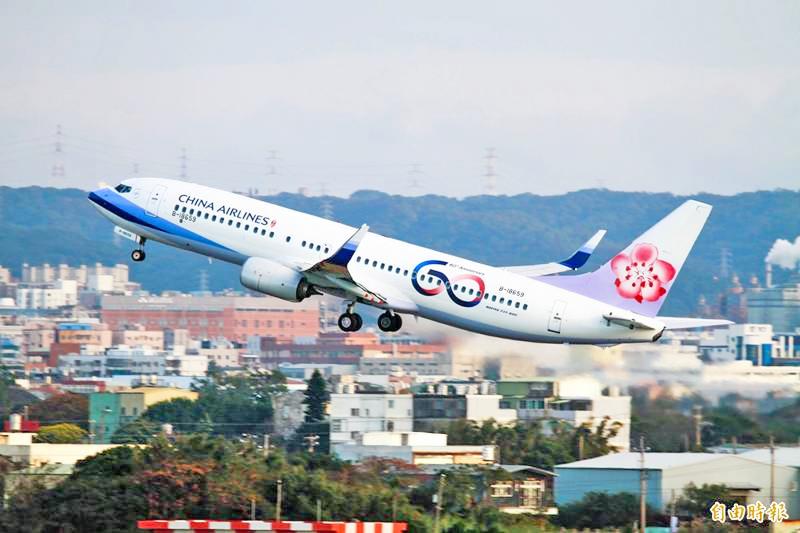China Airlines Ltd (中華航空) and its labor union on Thursday reached an agreement to distribute year-end bonuses of an average of six months wages, the best bonus distributed in the company’s 62-year history.
The airline is also to raise wages by at least 4 percent, matching salary increases for the nation’s teachers, military personnel and civil servants, the union said in a statement.
As the airline last year posted profit thanks to its booming air cargo business, the company would distribute generous bonuses, the union said.

Photo courtesy of China Airlines via CNA
With 21 cargo jets, China Airlines is the largest provider of air cargo services in Taiwan.
The company reported cumulative net profit of NT$1.55 billion (US$55.98 million) for the first three quarters of last year, compared with a net loss of NT$2.02 billion in the same period of 2020, the union said.
During the first 11 months of last year, revenue grew 16 percent annually to NT$121.94 billion, corporate data showed.
This year, the airline plans to continue focusing on its air cargo business, but would also try to boost its passenger business, the company said in a statement.
Separately, EVA Airways Corp (長榮航空) did not verify local media reports that it had agreed to distribute year-end bonuses of as high as about 1.5 months’ wages, but said that employees would receive bonuses based on their work performance.
EVA reported a cumulative net loss of NT$569 million in the first three quarters of last year, improving from a net loss of NT$3.64 billion in the same period of 2020, corporate data showed.
With seven cargo jets, EVA has a lower cargo capacity than China Airlines, and generated less revenue from its air freight business, data released by the two firms showed.
For the first 11 months of last year, EVA’s sales grew 11.8 percent to NT$91.5 billion, corporate data showed.
China Airlines’ share price fell 1.46 percent to NT$27 in Taipei trading yesterday, while EVA’s share price dipped 1.1 percent to NT$27, Taiwan Stock Exchange data showed.

Taiwanese suppliers to Taiwan Semiconductor Manufacturing Co. (TSMC, 台積電) are expected to follow the contract chipmaker’s step to invest in the US, but their relocation may be seven to eight years away, Minister of Economic Affairs J.W. Kuo (郭智輝) said yesterday. When asked by opposition Chinese Nationalist Party (KMT) Legislator Niu Hsu-ting (牛煦庭) in the legislature about growing concerns that TSMC’s huge investments in the US will prompt its suppliers to follow suit, Kuo said based on the chipmaker’s current limited production volume, it is unlikely to lead its supply chain to go there for now. “Unless TSMC completes its planned six

Intel Corp has named Tasha Chuang (莊蓓瑜) to lead Intel Taiwan in a bid to reinforce relations between the company and its Taiwanese partners. The appointment of Chuang as general manager for Intel Taiwan takes effect on Thursday, the firm said in a statement yesterday. Chuang is to lead her team in Taiwan to pursue product development and sales growth in an effort to reinforce the company’s ties with its partners and clients, Intel said. Chuang was previously in charge of managing Intel’s ties with leading Taiwanese PC brand Asustek Computer Inc (華碩), which included helping Asustek strengthen its global businesses, the company

Power supply and electronic components maker Delta Electronics Inc (台達電) yesterday said second-quarter revenue is expected to surpass the first quarter, which rose 30 percent year-on-year to NT$118.92 billion (US$3.71 billion). Revenue this quarter is likely to grow, as US clients have front-loaded orders ahead of US President Donald Trump’s planned tariffs on Taiwanese goods, Delta chairman Ping Cheng (鄭平) said at an earnings conference in Taipei, referring to the 90-day pause in tariff implementation Trump announced on April 9. While situations in the third and fourth quarters remain unclear, “We will not halt our long-term deployments and do not plan to

The New Taiwan dollar and Taiwanese stocks surged on signs that trade tensions between the world’s top two economies might start easing and as US tech earnings boosted the outlook of the nation’s semiconductor exports. The NT dollar strengthened as much as 3.8 percent versus the US dollar to 30.815, the biggest intraday gain since January 2011, closing at NT$31.064. The benchmark TAIEX jumped 2.73 percent to outperform the region’s equity gauges. Outlook for global trade improved after China said it is assessing possible trade talks with the US, providing a boost for the nation’s currency and shares. As the NT dollar